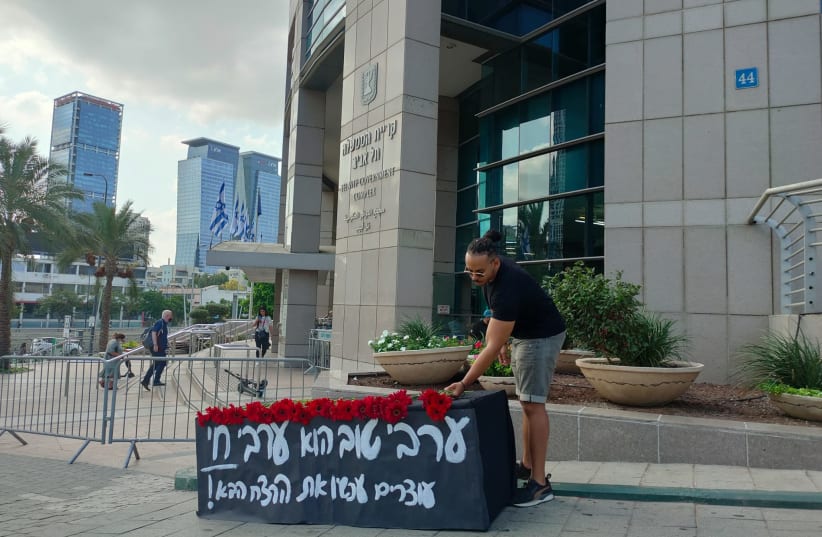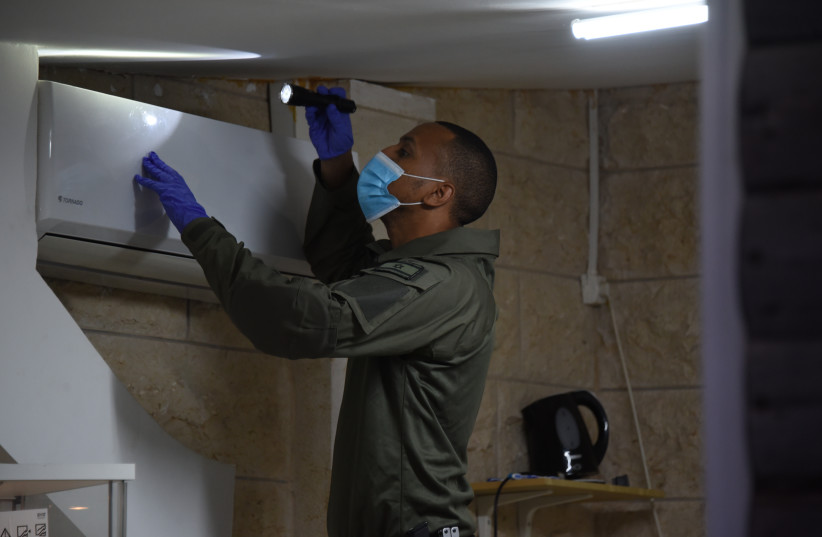As the wave of murders in the Israeli-Arab sector continues unabated, pressure is growing on the police, the prosecution and possibly even the Shin Bet (Israel Security Agency) to tackle the issue more aggressively.
Two murders in recent days brought the death toll in Arab communities for the year to 92, with over three months left in 2021.
Besides the almost constant rhythm of news reports of newly murdered Arabs of all ages, recent months have also seen Arab criminal groups murdering a senior adviser to Justice Minister Gideon Sa’ar and shooting at the house of a top Arab police commander handling the issue.
Though some cases get solved, many never do, and even those that are solved appear to take longer to solve than cases in which Jewish Israelis are killed.
What are the roots of the problem, what can the police and the prosecution do to reduce the wave of murders, and is the situation so dire that the Shin Bet should get involved?
Historically, the state and the police have ignored or had a hands-off policy regarding intra-Arab crime that did not impact Jewish Israelis.
It can be interesting to debate whether this is because Israel’s governments have not cared as much about the Arab sector, because they have been afraid of blowback from Arabs if the police were seen as being “too active” in their neighborhoods, or whether the story is a question of a lack of funding, resources and local police stations.
Yet, the bottom line is the issue has not received much attention other than when a spree of especially awful crimes breaks into the headlines.
There is some hope that the current government, which is the first to have an Arab party, Ra’am, may treat the issue more seriously.
In addition, other terrible headlines in recent years did finally lead the police to invest some more resources in dealing with the issue, especially in hiring more local Arab police and establishing some more physical police presences in Arab areas.
However, the negative trend of an increase in murders and of Arab criminal organizations feeling free to go after symbols of the rule of law seems to have overwhelmed these positive trends.
Former head of the police operations command Yaakov “Kobi” Cohen explained that the current weakness of the police in handling the issue is multifaceted.
First, he noted that the problem is a long-term one requiring long-term solutions addressing both the phenomenon and the underlying socioeconomic causes.
Next, he said, “The police have the capabilities to deal with the phenomenon. The question is, are they organized sufficiently operationally? The police have the tools and the manpower. But it [a solution] will not be [as simple as] pushing a button. Long-term, the police can devise plans, and the prosecution can support this with its work in the courts, and they can reduce the phenomenon.”
Cohen was pressed that even with many public commitments and pronouncements in recent months to get a handle on the murder wave, to date, it seems there has been no progress.
He emphasized that announcements of hiring 1,000 new police “will not happen tomorrow. It will be a process that will take one to two years. No one should build their expectations on having a solution tomorrow.”
However, he also said the root problem within the police was the cratering morale within the organization.
“When you have a state commission of inquiry hovering over your head, it is extremely damaging... and the police have been much less effective. It is in a very difficult place,” referring to the Mount Meron disaster probe.
More specifically, he said that most of the police’s high command was implicated in one way or another in the inquiry, and this made it “very hard for the police to take up a conflict within the Arab sector. But if the police get strengthened and backed from the political echelon and the government,” things could improve.
Until then, he said, “The police are in a deep hole and will not be strong enough” to turn the tide despite having the capabilities to do so.
The police spokesperson responded by listing many recent accomplishments of the police in terms of increased arrests and confiscation of weapons in the Arab sector, as well as opening up more police stations there.
The spokesperson placed some blame on the Arab sector itself, stating that victims of crimes and their families were less cooperative with police in comparison to the broader public.
A statement by the police did not clarify whether they believe this is based on an ideological objection to working with the Jewish state’s law enforcement arm, or whether it is part of a harsh calculation by some victims that they could face more violence if they cooperate with the police.
Meanwhile, Sa’ar has put forward several new bills to try to empower law enforcement, the prosecution and generally combat Arab-sector violence.
But with the Knesset in recess and the slow speed of legislation, none of these measures are expected to change the picture for some time.
IF THE police cannot turn the tide on their own, for whatever the reason, what about the Shin Bet?
The agency has drone-spying and human-spying capabilities, hacking telephone and email capabilities, tracking capabilities and interrogation and detention tools that the police do not have, which it uses to crack tough cases of terrorism.
Publicly, the Shin Bet’s only comments are that this is a complex issue for the country’s political echelon to decide.
However, multiple former officials have expressed concern about the counterterrorism agency getting involved in domestic criminal issues – even severe ones that appear to be out of control.
Worries about the Shin Bet getting involved in anything other than counterterrorism are already high after the agency was used for over a year to track corona-infected citizens.
Those who favor Shin Bet intervention argue that the agency may have more of a basis to intervene after the May 10-21 war with Gaza when various Arab criminal organizations crossed over into nationalist actions supporting Hamas.
In addition to authentic concerns from the Arab sector of mistreatment by the state, these groups helped cause widespread chaos, which some view as a more strategic threat than mere criminal activity.
Former attorney-general Yehuda Weinstein said he opposes involving the Shin Bet in domestic issues, as it would be a slippery slope with unpredictable consequences.
Instead, he recommends a mix of significantly improved education and increased police presence and enforcement for the Arab sector as part of a mix of short- and long-term strategies.
Cohen said, “It would be rushing in too soon. Look at how the Shin Bet handled the escaping terrorists [from Gilboa Prison]. They are for a surprise solution to an extreme situation. Their tools are for combating terrorism. I don’t think we are in a place yet where we need to use the Shin Bet.
“The police have the capacity to handle things. Someone [suggesting the Shin Bet] is searching for an easy and fast solution for this period, but [in the] long term, this needs meticulous and well-planned work, operations and follow-through as well as a greater presence and both more undercover and public actions. I do not think we have reached the emergency point where we need the Shin Bet,” he said.
In the meantime, as long as the wave of murders continues, all of these ideas are very much in play.

